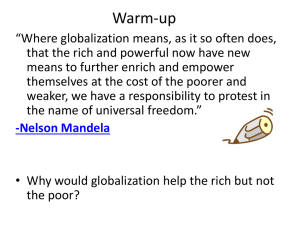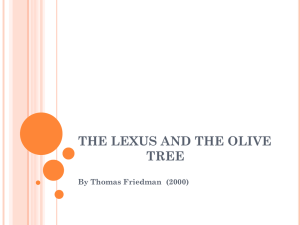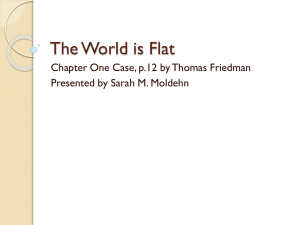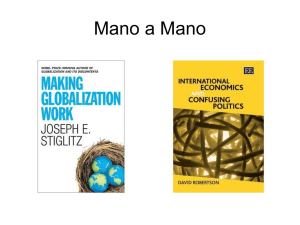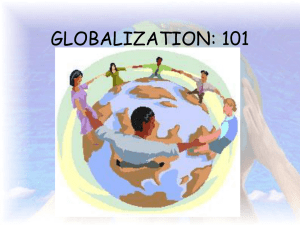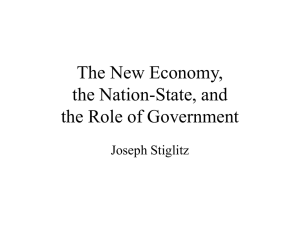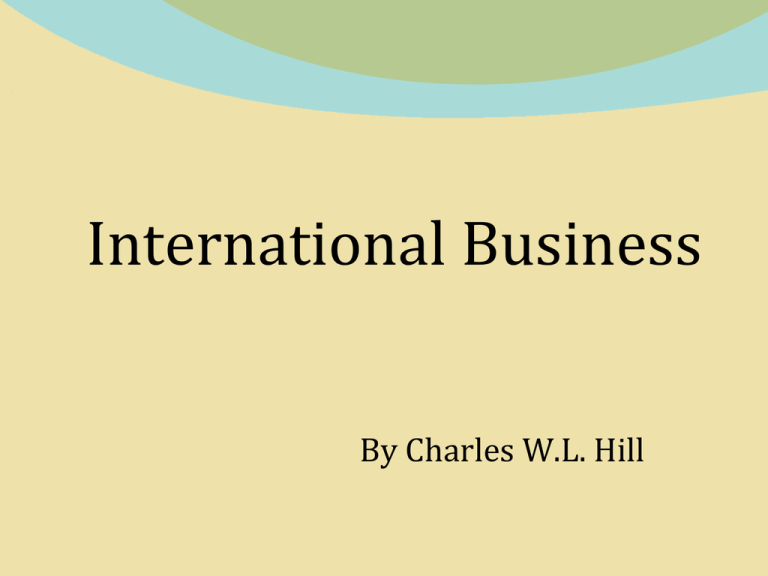
International Business
By Charles W.L. Hill
Chapter 1
Globalization
McGraw-Hill/Irwin
Copyright © 2011 by the McGraw-Hill Companies, Inc. All rights reserved.
What Is Globalization?
The world is moving away from selfcontained national economies toward an
interdependent, integrated global economic
system
Globalization refers to the shift toward a
more integrated and interdependent world
economy
1-3
What Is The
Globalization of Markets?
Historically distinct and separate national markets
are merging
It no longer makes sense to talk about the
“German market” or the “American market”
Instead, there is the “global market”
falling trade barriers make it easier to sell globally
consumers’ tastes and preferences are converging on
some global norm
firms promote the trend by offering the same basic
products worldwide
1-4
What Is The
Globalization of Production?
Firms source goods and services from
locations around the globe to capitalize on
national differences in the cost and quality
of factors of production like land, labor,
and capital
Companies can
lower their overall cost structure
improve the quality or functionality of their
product offering
1-5
Why Do We Need
Global Institutions?
Institutions
help manage, regulate, and police the global
marketplace
promote the establishment of multinational treaties to
govern the global business system
Examples include
the General Agreement on Tariffs and Trade (GATT)
the International Monetary Fund (IMF)
1-6
What Does Globalization
Mean For Firms?
Lower barriers to trade and investment mean firms can
view the world, rather than a single country
base production in the optimal location for that activity
Technological change means
lower transportation costs - firms can separate locations
lower information processing and communication costs - firms can
create and manage production systems
low cost global communications networks - help to create an
electronic global marketplace
low-cost transportation - help create global markets
global communication networks and global media - create a
worldwide culture
1-7
The Changing Demographics
Of The Global Economy
There has been a change in the demographics of
the world economy in the last 30 years
Four trends are important:
1. the Changing World Output and World Trade
Picture
2. the Changing Foreign Direct Investment Picture
3. the Changing Nature of the Multinational
Enterprise
4. the Changing World Order
1-8
How Has Foreign Direct
Investment Changed Over Time?
Percentage Share of Total FDI Stock 1980-2007
1-9
How Has Foreign Direct
Investment Changed Over Time?
FDI Inflows 1988-2008
1-10
What Is A
Multinational Enterprise?
A multinational enterprise (MNE) is any
business that has productive activities in
two or more countries
Since the 1960s, there has been a rise in
non-U.S. multinationals, and a growth of
mini-multinationals
1-11
The Changing World Order
Many former Communist nations in Europe and
Asia are now committed to democratic politics and
free market economies
so, there are new opportunities for international
businesses
China and Latin America are also moving toward
greater free market reforms
between 1983 and 2008, FDI in China increased from
less than $2 billion to $90 billion annually
1-12
How Will The Global Economy
Of The 21st Century Look?
The world is moving toward a more global
economic system
But globalization is not inevitable
there are signs of a retreat from liberal economic
ideology in Russia
Globalization brings risks
the financial crisis that swept through South East Asia
in the late 1990s
the recent financial crisis that started in the U.S. in
2008, and moved around the world
1-13
Is An Interdependent Global
Economy A Good Thing?
Supporters believe that increased trade and crossborder investment mean
lower prices for goods and services
greater economic growth
higher consumer income, and more jobs
Critics worry that globalization will cause
job losses
environmental degradation
the cultural imperialism of global media and MNEs
1-14
How Does Globalization Affect
Jobs And Income?
Critics argue that falling barriers to trade
are destroying manufacturing jobs in
advanced countries
Supporters contend that the benefits of this
trend outweigh the costs
countries will specialize in what they do most
efficiently and trade for other goods—and all
countries will benefit
1-15
How Is Globalization
Affecting The World’s Poor?
Is the gap between rich nations and poor nations
is getting wider?
Critics believe that if globalization was beneficial
there should not be a divergence between rich and
poor nations
Supporters claim that the best way for the poor
nations to improve their situation is to
reduce barriers to trade and investment
implement economic policies based on free market
economies
receive debt forgiveness for debts incurred under
totalitarian regimes
1-16
How Does The Global
Marketplace Affect Managers?
Managing an international business differs from
managing a domestic business because
countries are different
firms have to find ways to work within the limits
imposed by government intervention in the
international trade and investment system
international transactions involve converting money
into different currencies
1-17
Review Question
The shift toward a more integrated and
interdependent world economy is referred to
as
a) economic integration
b) economic interdependency
c) globalization
d) internationalization
1-18
Review Question
The merging of historically distinct and
separate national markets into one huge
global marketplace is known as
a) global market facilitation
b) cross-border trade
c) the globalization of markets
d) supranational market integration
1-19
Review Question
Firms that are involved in international
business tend to be
a) large
b) small
c) medium-sized
d) large, small, and medium-sized
1-20
Review Question
Which is not a factor of production?
a) land
b) capital
c) trade
d) energy
1-21
Review Question
The sourcing of good and services from
around the world to take advantage of national
differences in the cost and quality of factors of
production is called
a) economies of scale
b) global integration
c) the globalization of production
d) global sourcing
1-22
Review Question
Which organization is responsible for policing
the world trading system?
a) the International Monetary Fund
b) the United Nations
c) the World Trade Organization
d) the World Bank
1-23
Review Question
Which of the following trends is true?
a) the United States is accounting for a greater
percentage of world trade than ever before
b) the United States is accounting for a greater
percentage of foreign direct investment than ever
before
c) the share of world trade accounted for by
developing countries is rising
d) the share of foreign direct investment by
developing countries is declining
1-24
Review Question
Which of these is not a concern of anti-globalization
protesters?
a) globalization is causing a loss of manufacturing
jobs in developing countries
b) globalization contributes to environmental
degradation
c) Globalization raises consumer income
d) globalization implies a loss of national
sovereignty
1-25



